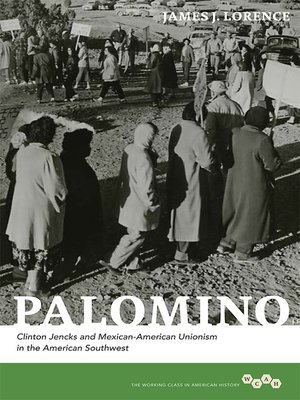Palomino
ebook ∣ Clinton Jencks and Mexican-American Unionism in the American Southwest · Working Class in American History
By James J. Lorence

Sign up to save your library
With an OverDrive account, you can save your favorite libraries for at-a-glance information about availability. Find out more about OverDrive accounts.
Find this title in Libby, the library reading app by OverDrive.



Search for a digital library with this title
Title found at these libraries:
| Library Name | Distance |
|---|---|
| Loading... |
The first comprehensive biography of progressive labor organizer, peace worker, and economist Clinton Jencks (1918–2005), this book explores the life of one of the most important political and social activists to appear in the Southwestern United States in the twentieth century. A key figure in the radical International Union of Mine, Mill, and Smelter Workers (IUMMSW) Local 890 in Grant County, New Mexico, Jencks was involved in organizing not only the mine workers but also their wives in the 1951 strike against the Empire Zinc Company. He was active in the production of the 1954 landmark labor film dramatizing the Empire Zinc strike, Salt of the Earth, which was heavily suppressed during the McCarthy era and led to Jencks's persecution by the federal government. Labor historian James J. Lorence examines the interaction between Jencks's personal experience and the broader forces that marked the world and society in which he worked and lived. Following the work of Jencks and his equally progressive wife, Virginia Derr Jencks, Lorence illuminates the roots and character of Southwestern unionism, the role of radicalism in the Mexican-American civil rights movement, the rise of working-class feminism within Local 890 and the Grant County Mexican American community, and the development of Mexican-American identity in the Southwest. Chronicling Jencks's five-year-long legal battle against charges of perjury, this biography also illustrates how civil liberties and American labor were constrained by the specter of anticommunism during the Cold War. Drawing from extensive research as well as interviews and correspondence, this volume highlights Clinton Jencks's dramatic influence on the history of labor culture in the Southwest through a lifetime devoted to progress and change for the social good.
| Cover Title Page Copyright Page Contents Acknowledgments Abbreviations Introduction: Clinton Jencks, Mine-Mill, and Biography as History Part I. Years of Preparation: Roots of Radicalism 1. Growing Up Concerned: Childhood, Family, and the Formation of a Value System, 1918-1939 2. The World of Work and New Opportunities for Social Action: Living Faith, 1939-1945 Part II. Building for the Future: Envisioning a New World 3. Coming Home: Veterans Advocacy and Renewed Political Commitment 4. Mine-Mill and Social Change: Economic Progress, Mexican American Activism, and social Justice, 19 Part III. Cold War Unionism: Progressives on Defense 5. Mobilizing for Mass Action: Social and Political Initiatives, 1948-1950 6. The Moment of Decision: the Empire Zinc Strike, Grassroots Feminism, and Mexican American Liberat 7. Telling the Story: Salt of the Earth as a Medium of Communication Illustrations follow page 130 Part IV. A Time of Peril: Public Exposure 8. Confronting Domestic Anti-Communism: The Jencks Case, Civil Liberties, and the Law, 1953-19547 9. The Web of Consequences: Life after Mine-Mill Epilogue: A Reflection on the Committed Life Notes Bibliography Index | "This authoritative and engagingly written biography makes a substantial contribution to the scholarship on the legendary labor figure of Clinton Jencks. A useful and welcome volume for historians of labor (especially in the southwest), communism, and Cold War anti-communism."—David Brundage, author of The Making of Western Labor Radicalism: Denver's Organized Workers, 1878–1905
"As new scholarship on the long civil rights movement continue to incorporate studies of the American West and move beyond black-white racial binaries, Palomino rightfully speaks to both of these important historiographical developments."—Western Historical Quarterly
"An excellent biography...
| Cover Title Page Copyright Page Contents Acknowledgments Abbreviations Introduction: Clinton Jencks, Mine-Mill, and Biography as History Part I. Years of Preparation: Roots of Radicalism 1. Growing Up Concerned: Childhood, Family, and the Formation of a Value System, 1918-1939 2. The World of Work and New Opportunities for Social Action: Living Faith, 1939-1945 Part II. Building for the Future: Envisioning a New World 3. Coming Home: Veterans Advocacy and Renewed Political Commitment 4. Mine-Mill and Social Change: Economic Progress, Mexican American Activism, and social Justice, 19 Part III. Cold War Unionism: Progressives on Defense 5. Mobilizing for Mass Action: Social and Political Initiatives, 1948-1950 6. The Moment of Decision: the Empire Zinc Strike, Grassroots Feminism, and Mexican American Liberat 7. Telling the Story: Salt of the Earth as a Medium of Communication Illustrations follow page 130 Part IV. A Time of Peril: Public Exposure 8. Confronting Domestic Anti-Communism: The Jencks Case, Civil Liberties, and the Law, 1953-19547 9. The Web of Consequences: Life after Mine-Mill Epilogue: A Reflection on the Committed Life Notes Bibliography Index | "This authoritative and engagingly written biography makes a substantial contribution to the scholarship on the legendary labor figure of Clinton Jencks. A useful and welcome volume for historians of labor (especially in the southwest), communism, and Cold War anti-communism."—David Brundage, author of The Making of Western Labor Radicalism: Denver's Organized Workers, 1878–1905
"As new scholarship on the long civil rights movement continue to incorporate studies of the American West and move beyond black-white racial binaries, Palomino rightfully speaks to both of these important historiographical developments."—Western Historical Quarterly
"An excellent biography...







